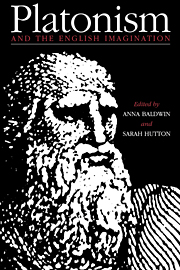Book contents
- Frontmatter
- Contents
- Notes on contributors
- Preface
- I ANTIQUITY
- II THE EARLY CHRISTIAN PERIOD AND THE MIDDLE AGES
- III THE RENAISSANCE AND THE SEVENTEENTH CENTURY
- 7 Introduction
- 8 The transformation of Platonic love in the Italian Renaissance
- 9 Uses of Plato by Erasmus and More
- 10 Italian Neoplatonism and the poetry of Sidney,Shakespeare, Chapman and Donne
- 11 Shakespeare on beauty, truth and transcendence
- 12 Platonism in Spenser's Mutability Cantos
- 13 Reason, Recollection and the Cambridge Platonists
- 14 Platonic ascents and descents in Milton
- 15 Platonism in some Metaphysical poets
- IV THE EIGHTEENTH CENTURY
- V THE NINETEENTH CENTURY
- VI THE TWENTIETH CENTURY
- Bibliography
- Index
10 - Italian Neoplatonism and the poetry of Sidney,Shakespeare, Chapman and Donne
Published online by Cambridge University Press: 15 December 2009
- Frontmatter
- Contents
- Notes on contributors
- Preface
- I ANTIQUITY
- II THE EARLY CHRISTIAN PERIOD AND THE MIDDLE AGES
- III THE RENAISSANCE AND THE SEVENTEENTH CENTURY
- 7 Introduction
- 8 The transformation of Platonic love in the Italian Renaissance
- 9 Uses of Plato by Erasmus and More
- 10 Italian Neoplatonism and the poetry of Sidney,Shakespeare, Chapman and Donne
- 11 Shakespeare on beauty, truth and transcendence
- 12 Platonism in Spenser's Mutability Cantos
- 13 Reason, Recollection and the Cambridge Platonists
- 14 Platonic ascents and descents in Milton
- 15 Platonism in some Metaphysical poets
- IV THE EIGHTEENTH CENTURY
- V THE NINETEENTH CENTURY
- VI THE TWENTIETH CENTURY
- Bibliography
- Index
Summary
ITALIAN NEOPLATONISM
Much of the influence of Neoplatonism on Elizabethan erotic poetry can be traced directly to the impact made by Castiglione's Il cortegiano (see Hutton, pp. 72–3, above). The pertinent ideas of Ficino concerning the body's beauty and that of the soul, as well as Ficino's novel arrangement (following plotinus Enneads 1.6) of the senses according to a hierarchy of values, find expression in Bembo's famous speech in Book iv of Il cortegiano. These are the ideas which principally shape those poems of Sidney, Shakespeare, Chapman, and Donne which provide the material for this chapter. I propose to examine in turn the Neoplatonic features of Astrophil and Stella, Venus and Adonis,Ovids Banquet of Sence, and The Songs and Sonets of John Donne, concluding with ‘The Ecstasy’.
Immediately striking about the English encounter with Italian Neoplatonism is how the latter's influence on the poetry operates, the philosophical ideas being adapted, not to say redirected, to poetic ends. This makes the poets I am dealing with quite different in tone and intention from Spenser whose abstract thinking in his most overtly Neoplatonic work The Fowre Hymnes traces a more orthodox Platonic design (see Thomas Bulger's chapter in this volume.) For example, the figure represented as Astrophil in Sidney's sonnet sequence directs the Platonic theory of pure love to the ends of seduction, while Venus the spokeswoman of desire in Shakespeare's poem artfully modifies the order Ficino gives to the senses to vindicate those of them upon which Ficino (and Castiglione) would place least value (see below, pp.108–10).
- Type
- Chapter
- Information
- Platonism and the English Imagination , pp. 100 - 116Publisher: Cambridge University PressPrint publication year: 1994
- 1
- Cited by



